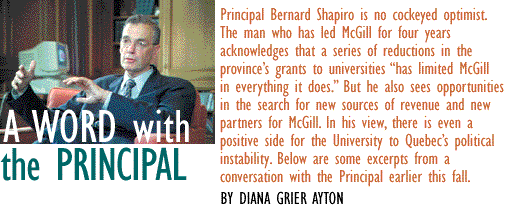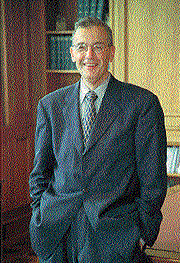
On new strategies for McGill
For McGill to continue to serve an exciting role in higher education, we need to remain the best game in town and the only international game in town. By "town," I don't mean Montreal, I mean the broader environment. The only way to achieve that is by having a much more complex and more sophisticated set of relationships with all kinds of knowledge-rich enterprises -- including universities -- outside McGill.
This idea is not new. After all, McGill has participated in international networks for over a century and we've had international students for just as long. What is new is that the stakes are higher and the standards are higher. These linkages will have to be much more elaborate if we're going to be at the frontiers of knowledge. You have to participate in international networks for that knowledge to be developed.
That has led me to focus on what the other agencies or enterprises are with whom we might have a useful and interesting relationship. Remember, as society becomes increasingly knowledge-intensive and as knowledge becomes a more important factor of production, we are in competition for the most sophisticated knowledge workers, who should be the members of our faculty. There are lots of other places that want those same people, not just universities. If we're going to participate in that competition -- let alone win it -- we've got to have a much more permeable boundary between ourselves and these other knowledge-rich enterprises, whether in the public or private sector.
One way to do that is to provide more occasions for interaction or exchange across those boundaries. That's one way of thinking about it. The second way of thinking about it is that we wish to have a very large number of international students at McGill. We already have, by far, the largest proportion of international students in Canada, but it's not high enough. If we're going to attract more, we have to be present in the international marketplace. Our researchers, our alumni, our recruiters, our faculty have to be out there so that McGill becomes a visible presence in as many international contexts as is possible given our limited resources, limited time and limited everything else.
On the importance of international students
The presence of students from other countries and cultures enormously enriches the learning environment for everybody, irrespective of who you are. That's true for students from Quebec, from other parts of Canada and for other international students. That alone would seem sufficient grounds for increasing their numbers.
The international networks we will need in the future -- not simply for recruiting students, but to enable the research enterprise to be as exciting and as useful as it can be -- are partly created by having the students here now. It's easier to establish contact with someone in Central Africa who is an alumnus than with someone who isn't. That's not a very sophisticated idea. But sustaining those networks over time is a sophisticated idea, because doing so is very time-consuming and very resource-intensive. People frequently underestimate how much effort it takes to sustain something. Starting isn't so hard -- there are always a couple of champions around who are interested in a particular program or idea and they make it happen. How do you make it happen when you're not around? Or when the people who start things move on, as they all do? None of us are here forever. Sustaining them over time takes an enormous institutional effort, but that's the price that must be paid to sustain yourself as an international institution. And what other role is there for McGill? It's always been part of our history. To focus on being a locally salient institution wouldn't be very sensible. There are plenty of universities in Quebec. What would we be needed for?
 On some effects of budget cuts
Tight budgets lead people to look further and further afield for sources of revenue. And that's bound to bring in things that you hadn't thought were suitable or partnerships that hadn't even occurred to you in the first place. You're doing exactly what any other enterprise would do when it needed input in order to provide its output. It might be bad, but it might not be. It might be one of the best things that ever happens to you. It's a question of holding on to your values and priorities as you open yourself up to other people and other ways of doing things.
There is always a risk, for example -- whether you are cooperating with another university or a private sector firm -- that as compromises inevitably emerge, you will lose your main objective. The challenge is always to make arrangements in which objectives wider than your own are being served but in which your central values and your objectives are being realized at the same time. All research-intensive universities will in the end have much more active interfaces with enterprises outside themselves -- whether they're universities or not -- than has been true in the past.
On McGill's role in Quebec
We have to remind ourselves -- and everybody else -- that McGill is a publicly funded institution, paid for primarily by the taxpayers of Quebec, and that about half of our students are from Quebec. Therefore, we must be responsive to the environment which supports us.
I'm very interested in what francophones call "les racinements" or the "rootedness" of McGill in Quebec. We want our alumni to be active, productive citizens in their societies, and we have to be one, too. Quebec is the most important single society in which we exist. I have no interest whatsoever in McGill as a francophone institution because there are lots of other francophone institutions around McGill, but we need to be related to them in an interesting and productive way.
When I agreed to be the president of CREPUQ [Conférence des recteurs et des principaux des universités du Québec] for a two-year period, I knew that there would be times when the majority view in CREPUQ would be quite different from mine as the principal of McGill. And although sometimes I convince them about my point of view, at other times I have to carry the flag for the common point of view. But I've never felt under any obligation to do anything that would be contrary to McGill's interest -- I'd rather resign. My first obligation is to the University that employs me.
One strength that a university like McGill has is that it is a relatively comprehensive institution, which puts you in a position of being able to imagine participating almost no matter what comes up. It also helps in the current uncertain political/constitutional environment, which has had a kind of a perverse effect: that is that people in Montreal are more prepared to cope with serious change because it's around them all the time, it's around them in the city, it's around them in the province.
However exhausted people are by the endless questions that go on and on without being resolved, they are nevertheless psychologically prepared for many kinds of changes that other people have to work themselves up to. The linguistic tensions can be aggravating, but they also sensitize people to the differences between people and perhaps give them a more open outlook. We have a sort of ready-made international context on the street.
On the controversial "Bouchard trip"
[Principal Shapiro participated in a provincial government delegation which visited the U.S. this summer. His decision to do so earned him some angry letters from alumni.]
Complications can easily develop in an anglophone/francophone environment. When I accompanied Premier Bouchard on this trip, many people took that as a sign that I was in favour of separatism. I believe that in a democratic society, whoever is elected is everybody's premier, not just those who elected him. And when the Premier calls with an invitation, you don't say no just because you don't happen to approve of his politics.
From my point of view, it was an opportunity for two things. One was to improve my network within Quebec -- I was going to spend the week with all kinds of people I don't normally see and certainly not in such intimate circumstances. Second, I was going to have a chance to project not only Quebec universities, but also McGill, on an audience that I don't normally see. What could be better?
I now have much more access to the provincial government network than I had before. I know the people and they answer my calls immediately. I've also had at least seven or eight visits from people I met to discuss possible support for McGill research by their corporations.
It was a positive experience and I would do it again. The minus is that some of our alumni are outraged and they write and tell me about that. So nothing is perfect.
On the role of alumni
There is what I would call a passive role and an active role for alumni. The passive role, I think, is that of being model citizens. If people see graduates of McGill as productive, contributing citizens in their society, that's an important thing for McGill. That creates an image of the University that's very positive and, I think, of considerable value.
There are a whole variety of active roles, and what I'm always concerned about is not to limit those to financial support. Certainly it's important for alumni to provide for someone else's future as others provided for theirs, but that's not the only active role. Anything our alumni can do to make sure that really highly qualified students think of McGill as an option is very, very helpful. Alumni can act also as contact points for us in other places in the world -- to give us an entrée into a place which might be difficult otherwise. Or even make us aware of a place that would be glad to hear from us, but which we don't know about.
While there are all kinds of interesting things alumni can contribute to the future benefit of McGill, there ought to be things that we do for them. We shouldn't stop trying to contribute to the lives of our alumni when they leave the University. It's only two-way streets that work in the end, and so we've got to want to engage our alumni. To some extent, we can ask for that engagement on the basis of what we've already provided in terms of their education, but we ought to try and make that a continuous stream and not just from time to time. Can we imagine a program that would provide alumni with learning opportunities either here, if they come to visit, or where they are? The answer is yes. The issue is can we deliver what might be useful.
|